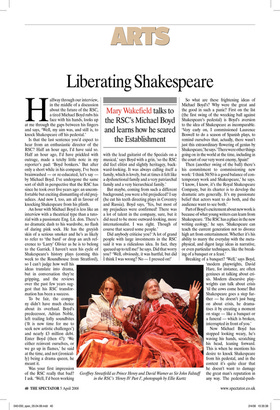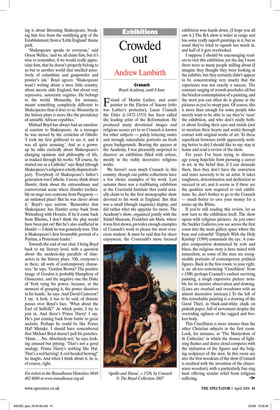Liberating Shakespeare
Mary Wakefield talks to the RSC’s Michael Boyd and learns how he scared the Establishment
Halfway through our interview, in the middle of a discussion about the future of the RSC, a tired Michael Boyd rubs his face with his hands, looks up at me through the gaps between his fingers and says, ‘Well, my aim was, and still is, to knock Shakespeare off his pedestal.’ Is that the last sentence you’d expect to hear from an enthusiastic director of the RSC? Half an hour ago, I’d have said so. Half an hour ago, I’d have prickled with outrage, made a tetchy little note in my reporter’s pad: ‘Boyd bonkers.’ But after only a short while in his company, I’ve been brainwashed — or re-educated, let’s say — by Michael Boyd. I’ve undergone the same sort of shift in perspective that the RSC has since he took over five years ago: an uncomfortable but exciting dismantling of old prejudices. And now I, too, am all in favour of knocking Shakespeare from his plinth.
An hour with Michael Boyd is less like an interview with a theatrical type than a tutorial with a passionate Eng. Lit. don. There’s no dramatic dash to his wardrobe, no flash of daring pink sock. He has the greyish skin of a serious smoker and he’s as likely to refer to ‘the bard’ or drop an arch reference to ‘Larry’ Olivier as he is to belong to the Garrick. I haven’t seen his cycle of Shakespeare’s history plays (coming this week to the Roundhouse from Stratford), so I can’t judge how well his ideas translate into drama, but in conversation they’re gripping, and the reviews over the past few years suggest that his RSC transformation has been a success.
To be fair, the company didn’t have much choice about its overhaul. Boyd’s predecessor, Adrian Noble, left trailing lofty soundbites (‘It is now time for me to seek new artistic challenges’) and nearly £3 million debt. Enter Boyd (then 47): ‘We either reinvent ourselves, or we go up in flames,’ he said at the time, and not (ironically) being a drama queen, he meant it.
Was your first impression of the RSC really that bad? I ask. ‘Well, I’d been working with the lead guitarist of the Specials on a musical,’ says Boyd with a grin, ‘so the RSC did feel elitist and slightly heritagey, backward-looking. It was always calling itself a family, which is lovely, but at times it felt like a dysfunctional family and a very patriarchal family and a very hierarchical family.’ But maybe, coming from such a different background, you were a bit prejudiced? I say (he cut his teeth directing plays in Coventry and Russia). Boyd says, ‘Yes, but most of my prejudices were confirmed! There was a lot of talent in the company, sure, but it did need to be more outward-looking, more internationalist. I was right. Though of course that scared some people.’ Did anybody criticise you? ‘A lot of grand people with large investments in the RSC said it was a ridiculous idea. In fact, they queued up to tell me!’ he says. Did that worry you? ‘Well, obviously, it was hurtful, but did I think I was wrong? No — I pressed on!’ So what are these frightening ideas of Michael Boyd’s? Why were the great and the good in such a panic? First on the list (the first swing of the wrecking ball against Shakespeare’s pedestal) is Boyd’s aversion to the idea of Shakespeare as incomparable. ‘Very early on, I commissioned Laurence Boswell to do a season of Spanish plays, to remind ourselves that, actually, there wasn’t just this extraordinary flowering of genius by Shakespeare,’ he says. ‘There were other things going on in the world at the time, including in the court of our very worst enemy, Spain!’ Then (another swing of the ball) there’s his commitment to commissioning new work: ‘I think 50/50 is a good balance of contemporary work and Shakespeare,’ he says. ‘I know, I know, it’s the Royal Shakespeare Company, but its charter is to develop the dramatic arts generally. It’s my passionate belief that actors want to do both, and the audience want to see both.’ Part of Boyd’s excitement about new work is because of what young writers can learn from Shakespeare. ‘The RSC has a place in the new writing ecology,’ he says. ‘Shakespeare can teach the current generation not to divorce high art from entertainment. Whether it’s his ability to marry the everyday with the metaphysical, and digest large ideas in narrative, or even particular techniques, like the breaking of a banquet or a feast.’ Breaking of a banquet? ‘Well,’ says Boyd, ‘modern playwrights, David Hare, for instance, are often geniuses at talking about crisis. Modern discursive playwrights can talk about crisis ’til the cows come home! But Shakespeare goes a step further — he doesn’t just bang on about crisis, he dramatises it by creating a moment on stage — like a banquet or a funeral — which is broken, interrupted in front of you.’ Now Michael Boyd has stopped looking weary, he’s waving his hands, scratching his head, leaning forward. This is when he mentions his desire to knock Shakespeare from his pedestal, and in the context it’s quite clear that he doesn’t want to damage the great man’s reputation in any way. The pedestal-push ing is about liberating Shakespeare, breaking him free from the stultifying grip of the Establishment; from a ‘Little England’ theme park.
‘Shakespeare speaks to everyone,’ said Orson Welles, ‘and we all claim him, but it’s wise to remember, if we would really appreciate him, that he doesn’t properly belong to us but to another world that smelled assertively of columbine and gunpowder and printer’s ink.’ Boyd agrees: ‘Shakespeare wasn’t writing about a twee little country, about merrie olde England, but about very repressive, autocratic regimes. He belongs to the world. Monarchy, for instance, meant something completely different to Shakespeare than it does to us. Monarchy in the history plays is more like the presidency of unstable African republics.’ Michael Boyd has always had an emotional reaction to Shakespeare. As a teenager he was moved by the eroticism of Othello: ‘I took my first girlfriend to see it, and it was all quite arousing.’ And as a grownup he talks excitedly about Shakespeare’s changing opinions and philosophy of life, as tracked through his works. ‘Of course, he started out as a Catholic!’ says Boyd (though Shakespeare’s religion is a hotly disputed subject). ‘Everybody of Shakespeare’s father’s generation was Catholic. I mean, think about Hamlet, think about the extraordinary and controversial scene where Hamlet irrefutably on stage sees someone from Purgatory — an outlawed place! But he was clever about it,’ Boyd’s eyes narrow. ‘Remember that Shakespeare has Hamlet come back from Wittenberg with Horatio. If he’d come back from Rheims, I don’t think the play would have been put on! But he’s also conflicted in Hamlet — I think he was genuinely torn. This is Shakespeare’s first favourable portrait of a Puritan, a Protestant leader.’ Towards the end of our chat, I bring Boyd back to my literary level, with a question about the modern-day parallels of characters in the history plays. ‘Oh, everyone’s in there, all sorts of contemporary characters,’ he says. ‘Gordon Brown? The positive image of Gordon is probably Humphrey of Gloucester, and the negative one the Duke of York vying for power, because, at the moment of grasping it, the power dissolves in his hands,’ he says. And David Cameron? I say. A look, it has to be said, of distaste passes over Boyd’s face. ‘What about the Earl of Suffolk?’ At which point, I try to join in. And there’s Prince Harry! I say. He’s just coming back from battle to great acclaim. Perhaps he could be like Prince Hal! Mistake. I should have remembered that Michael Boyd doesn’t pull his punches. ‘Hmm ... No. Absolutely not,’ he says, looking amused but pitying: ‘That’s not a good analogy. Prince Harry’s nothing like Hal. That’s a red herring! A red-headed herring!’ he laughs. And when I think about it, he is, of course, right.
For tickets to the Roundhouse Histories: 0844 482 8008 or www.roundhouse.org.uk



































































 Previous page
Previous page